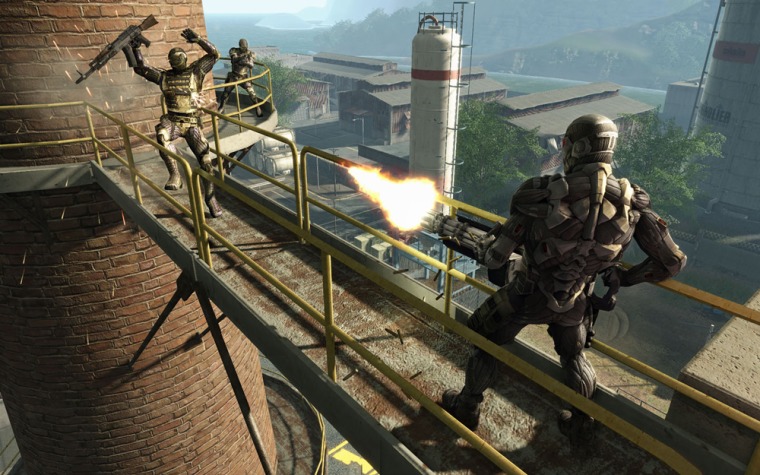Remember the Vista launch of six months ago? PC gamers do. The operating system was supposed to usher in a whole new era for the second-fiddle platform.
Gamers had good reason to be excited. Microsoft promised cutting-edge new games that took advantage of all that Vista and DirectX 10 had to offer. Vista would elevate games to the start menu – prime real estate. PC gamers, used to flashy, splashy consoles getting all the attention, reveled in the promise of the coming nirvana.
Six months on, PC gamers are still waiting. And man, are they pissed.
Why? Judging from the forums and blog posts, there is plenty to be peevish about — the anemic Games for Windows - Live initiative, slow game performance and Vista’s demanding system requirements. But the chief complaint is the lack of new games.
At present, there are just a handful of titles that are support DirectX 10, the application processing interface that tells the video card in your PC how to draw the graphics onscreen. And to date, there are only two Vista-only titles — one of which is “Halo 2,” a three-year-old Xbox game.
Yawn.
To be fair, there are plenty of reasons why the title list is as skinny as an Olsen twin. The whole saga begins with Microsoft famously slipping Vista’s ship date several times, with the final move pushing the release date after the crucial holiday shopping season. That meant new PCs sold at year’s end didn’t come preloaded with Vista or with new graphics cards tucked into the guts of the hardware.
(MSNBC.com is a Microsoft-NBC Universal joint venture.)
As such, not many major-league studios have started developing titles for the new platform — yet. Some studios, like Gas Powered Games, were too far along in their game development to change course — particularly given the small initial audience. Other developers know that Vista and DirectX 10 will be ubiquitous soon enough, and see no reason to throw lots of dollars at development just now.
“It’s a chicken-and-egg thing,” says Billy Pidgeon, an analyst with IDC. “We need more [game] software, yes, but we also need more Vista out there.”
Microsoft, for its part, says that it’s on track with Vista, citing 40 million units sold to date. And the company points to its list of planned titles, which include “Alan Wake,” from Remedy, “Age of Conan: Hyborian Adventures,” from Funcom and “Crysis,” from Crytek, as reasons PC gamers should hang tight — and quit complaining.
“ I think by the time gamers get their hands on the titles that are really taking full advantage of DX10, which will be this year, all the discussion about ‘was it fast enough’ will go away because people will be that impressed,” says Kevin Unangst, global director of the company’s Games for Windows initiative.
Microsoft faces an uphill climb, though. The game forums are rife with posts from furious gamers who feel as though the company duped them — or worse yet, that the Redmond company is actually conspiring to kill PC gaming.
But Unangst says that nothing could be further from the truth. “Starting with Windows 95, we’ve built Windows as a gaming platform. Over the last year, we’ve invested more than ever,” he says.
Industry watchers do believe that what Microsoft and its partners have started with Vista and DirectX 10 is unquestionably the future of PC gaming. And the rollout of any new platform — particularly one so dependent on third-party developers — is going to have some bumps in the road.
“When DirectX 9 was introduced late in 2002, it took many months for mainstream games supporting [it] to appear,” says Jason Cross, a technology analyst with ExtremeTech.com. “In fact, it wasn't until 2004 that we started to see a fair number of games that really made use of it.”
Why? Because game development is difficult and time-consuming. Electronic Arts, which has a large pool of talent available, still needs a year to crank out sequels. If you have a smaller team, or are creating a new game from scratch, that takes even longer. Add game-changing technology to the mix? Bank on three years — or in the case of Flagship Studios’ “Hellgate: London,” the long-anticipated title from the original “Diablo” developers — close to four years.
“Challenges come along with you’re working with changing technologies,” says company CEO Bill Roper. “It’s like trying to build a house on shifting sands.”
The bad news? Game development times aren’t likely to get any shorter. According to Cevat Yerli, CEO of Crytek, the demands on game developers only increase as the technologies get more sophisticated. And as such, he predicts that the average development time for high-end will be two to three years – minimum,
“The costs are more, the risks are bigger, the pressure for innovation is higher,” he says. “The gamers will have to be more patient.”
